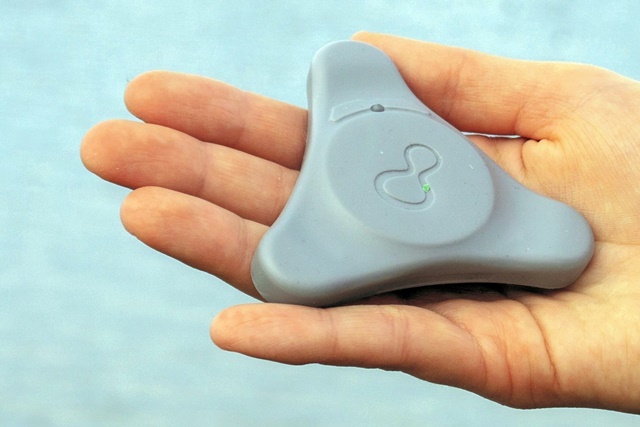7 July 2021. Medical researchers are assessing the feasibility of a wearable device to detect advance indicators of chronic respiratory disease symptoms. Giovanni Ferrara, professor of pulmonary medicine at University of Alberta in Edmonton is leading the clinical study of the ADAMM-RSM, made by medical device developer Health Care Originals Inc. in Rochester, New York. Health Care Originals also provides part of the funds for the study.
The ADAMM-RSM is the research version of the ADAMM personal device, designed to help people with asthma manage their disease. Asthma is a chronic condition, where the airways become inflamed and narrow, causing wheezing, shortness of breath, tightness in the chest, and coughing for periods of time. The personal ADAMM version is made of soft plastic and worn on the chest, side, or back.
The device detects and measures coughing patterns, heart and breathing rates, wheezing, temperature, and activity levels. ADAMM also tracks rescue inhaler use, records voice messages from the wearer, and notifies the wearer or a designee if symptoms deviate from normal. Data from ADAMM are captured via Bluetooth on a smartphone app, analyzed with algorithms, and uploaded to a Web portal for further analysis. Health Care Originals designed ADAMM-RSM for use in clinical trials to measure more respiratory factors than the personal device, and the company says it can provide more detection algorithms. ADAMM-RSM is available for research, but the personal device is not yet on the market.
The ADAMM technology is based on research at University of Rochester. Hyekyun Rhee, professor of nursing, and engineering professor Mark Bocko first developed the technology to better monitor adolescents with asthma. The technology was patented and company founded in 2014.
Pilot-stage clinical trial
Ferrara’s team from University of Alberta is evaluating ADAMM-RSM as a device to monitor patients with a wider range of respiratory diseases including cystic fibrosis, idiopathic pulmonary fibrosis, recent lung transplants, and tuberculosis. The study is designed as a pilot-scale clinical trial enrolling some 40 participants. The trial aims to determine if ADAMM-RSM can detect early changes in patients’ respiratory conditions, to prevent the need for emergency medical interventions later on. The university says chronic respiratory diseases are among the most common cause of admission to its medical center emergency department.
“The study will explore the possibility to predict when it’s the right time to see your physician based on the data collected by the device and artificial intelligence algorithms, before you get in trouble,” says Ferrara in a Health Care Originals statement released through Cision. “We don’t want a different way to look at the same thing, we want new tools.”
Ferrara also notes, “You can fine tune the intensity of treatment based on the intensity of symptoms depending on the phase of the pulmonary disease. This device is able to track clinical signs and symptoms in an objective way, helping to inform treatment decisions tailored to patients’ needs, thus providing a more precise control of their disease.”
If findings from the pilot study show promise, says the company, a second or third clinical trial could follow, targeting specific populations and enrolling larger sample sizes.
More from Science & Enterprise:
- Face Mask Sensor Detects Covid-19 Virus
- Flexible Electrodes Devised for Implanted Devices
- Apple Expands Health Data, Trends, Sharing
- Small Biz Award Funds Home Elder Muscle Device
- Hearing Tech Company Raises New Venture Funds
* * *


 RSS - Posts
RSS - Posts
[…] Univ. Lab Testing Wearable Respiratory Monitor […]